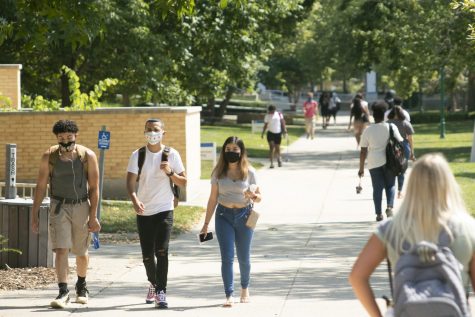
Eastern students are dealing with more than just homework this semester as allergy season begins to shift into gear.
Across campus, students relieve their allergy symptoms in different ways from medication to natural remedies.
“Having allergies makes it take longer to do assignments or tends to make me feel so miserable that I procrastinate said assignments,” junior English major Ian Rickett said.
Rickett deals with the consequences of allergies during the fall and spring semesters just like many students at EIU also do.
Fall allergies can range in several different symptoms from sneezing and coughing to sinus headaches and migraines.
For Rickett, runny nose, coughing, watery eyes, sneezing and fatigue are many of the symptoms that impede his schedule.
“Having my sinuses congested is really miserable. The sensory issues it brings about and the sensation of feeling weighed down really impede me,” he said.
According to the American College of Allergy, Asthma and Immunology, allergies are usually caused by the immune system seeing grains of pollen as a danger when they enter the body through an opening such as the nose. The body releases antibodies that attack the pollen. This attack then leads to the release of chemicals referred to as histamines into the blood.
Histamines are what causes the runny nose, itchy eyes and other hay fever symptoms that plague many college students during the semester.
According to Zyrtec’s website, fall allergies can be triggered from several different causes including ragweed pollen, mold or even dust mites.
About 75% of people, Zyrtec’s website said, are affected by ragweed pollen when it pollenates in the late summer and early fall, making it a huge contributor to the number of students that are affected by allergies during the fall semester.
And since ragweed usually pollinates specifically in both September and October, many students might be currently experiencing the effects of ragweed pollen.
So how does Rickett deal with his allergies while on campus?
“I either tough it out, or I take a Claritin,” he said.
According to the Centers for Disease Control and Prevention, there are many ways to reduce exposure to or calm the effects of allergens by checking the forecast for pollen rates, taking an antihistamine such as Zyrtec, Claritin or Allegra, avoid touching your eyes while outside and washing your hands once you are inside, take a shower after being outside for long periods of time, change into a clean pair of clothes, keeping windows closed during pollen season and using high efficiency filters in your home.
Rickett has his own advice for students who are suffering from allergies this semester.
“Claritin is a lifesaver,” he said.
EIU also has resources available to students on campus if they need assistance.
The Sarah Bush Lincoln EIU Medical Center is open for students Monday through Friday from 8 a.m.-12 p.m. and 1-4:30 p.m. Students can call 217-581-3013 to schedule an appointment.
Michelle Doty can be reached at 581-2812 or at mrdoty@eiu.edu.












![[Thumbnail Edition] Junior right-handed Pitcher Lukas Touma catches at the game against Bradley University Tuesday](https://www.dailyeasternnews.com/wp-content/uploads/2025/03/MBSN_14_O-e1743293284377-1200x670.jpg)

![[Thumbnail Edition] Eastern Illinois University baseball senior utility player Tyler Castro fields a ground ball during the team's first intrasquad scrimmage of the season on Jan. 31.](https://www.dailyeasternnews.com/wp-content/uploads/2025/03/BB_01_O-e1742874760130-1-e1742907504722-1200x911.jpg)
![[Thumbnail Edition] Senior Foward Macy McGlone, getsw the ball and gets the point during the first half of the game aginst Western Illinois University,, Eastern Illinois University Lost to Western Illinois University Thursday March 6 20205, 78-75 EIU lost making it the end of their season](https://www.dailyeasternnews.com/wp-content/uploads/2025/03/WBB_OVC_03_O-1-e1743361637111-1200x614.jpg)





































![The Weeklings lead guitarist John Merjave [Left] and guitarist Bob Burger [Right] perform "I Am the Walrus" at The Weeklings Beatles Bash concert in the Dvorak Concert Hall on Saturday.](https://www.dailyeasternnews.com/wp-content/uploads/2025/03/WL_01_O-1200x900.jpg)
![The team listens as its captain Patience Cox [Number 25] lectures to them about what's appropriate to talk about through practice during "The Wolves" on Thursday, March 6, in the Black Box Theatre in the Doudna Fine Arts Center in Charleston, Ill.](https://www.dailyeasternnews.com/wp-content/uploads/2025/03/WolvesPre-12-1200x800.jpg)















